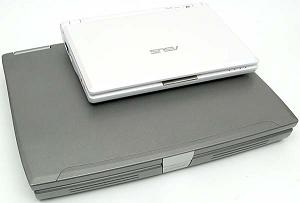 My mom told me that when I was younger, she worried that I would be the one child who didn’t get to travel, didn’t get to see the world. Both my sisters had already done Europe before they graduated from college, while I hadn’t left the continent by the time I graduated. But to her surprise and perhaps mine, I became quite a world traveler soon after. By the time I was 25 I had not only traveled internationally, but had been lucky enough to have flown first class to Europe, that once coveted location that my mom thought I’d never get to. But I was a road warrior, meaning I was traveling for business, taking 26 or more business trips a year. I learned quickly to pack light, and that meant a lightweight laptop as well. The company I worked for could afford it, and I made sure I always had the smallest, lightest laptop available. In the 1990’s that meant Toshiba Portege models and IBM X-series. Fast forward to today, and companies are trying to save money, so I don’t travel as much as I used to, and I’m lugging around a heavy 6 pound laptop.
My mom told me that when I was younger, she worried that I would be the one child who didn’t get to travel, didn’t get to see the world. Both my sisters had already done Europe before they graduated from college, while I hadn’t left the continent by the time I graduated. But to her surprise and perhaps mine, I became quite a world traveler soon after. By the time I was 25 I had not only traveled internationally, but had been lucky enough to have flown first class to Europe, that once coveted location that my mom thought I’d never get to. But I was a road warrior, meaning I was traveling for business, taking 26 or more business trips a year. I learned quickly to pack light, and that meant a lightweight laptop as well. The company I worked for could afford it, and I made sure I always had the smallest, lightest laptop available. In the 1990’s that meant Toshiba Portege models and IBM X-series. Fast forward to today, and companies are trying to save money, so I don’t travel as much as I used to, and I’m lugging around a heavy 6 pound laptop.
As soon as I heard about the netbook, I knew it was for me. It was low cost, ultra-light weight, and capable of doing practically everything I needed it to when I was on the road. Asus is generally credited with producing the first netbook, and Jonney Shih, the chairman of Asustek is considered the man behind the netbook craze.
Shih is also the largest shareholder of Asustek, the $21-billion-a-year Taiwan-based technology firm that introduced the first netbook three years ago, starting a revolution in the PC industry. When it hit stores in the fall of 2007, Shih’s low cost EeePC (priced initially at $399) was considered a toy by competitors. But Asustek, or Asus for short, went on to sell millions of the mini-notebooks and grew to No. 5 in worldwide PC market share.
Today almost every PC manufacturer, including Dell, Hewlett- Packard, and Toshiba, offers its own version of a netbook. But the biggest netbook maker, with 38% of the market, is another Taiwanese tech company, Acer. Asus, which had the market all to itself for about eight months, is now in second place, with a 30% share.
My own netbook is an Asus EeePC, and I’m grateful for the light weight, the utility, and the long battery life of the device when I’m on the road. It’s also great for keeping my daughter occupied when we’re on family trips. I’m certainly never taking the 6 pound monster work laptop on the road again. But be warned, if you’ve never seen one before, the first time you get your hands on one, may be a shock. They are deceptively small, a plus in my opinion!








